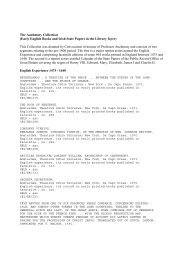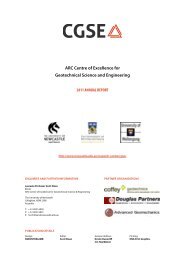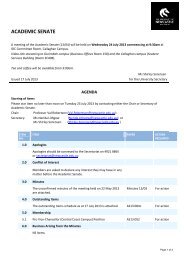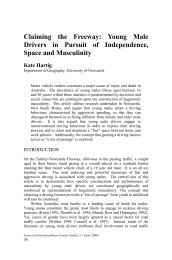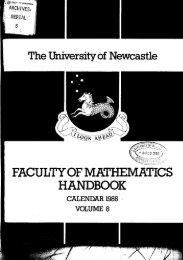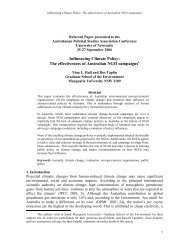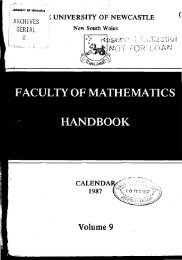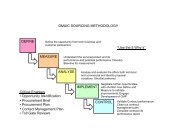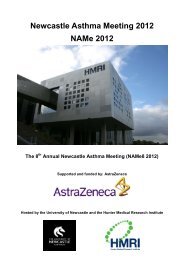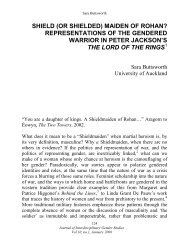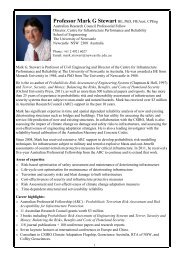n - University of Newcastle
n - University of Newcastle
n - University of Newcastle
Create successful ePaper yourself
Turn your PDF publications into a flip-book with our unique Google optimized e-Paper software.
12 AN AVSTEALIAX LASGCAGE.<br />
to the accusative ; as, a 1 i n -b a, ' belonging to us t~ro' ;<br />
g e a r u n-b a, ' be1011ging to us,' ' ours' ; b o u n n o u n -b a,<br />
beloi~ging to her,' 'hers ' The other singular pronouns add the<br />
pqrticles to a variant form <strong>of</strong> the root-rvord ; as, e m m o -u m b a,<br />
' belonging to me,' ' mine'; g i r o -n m b a. ' belongin~ to thee,'<br />
' thine.' But time and place require -1i a 1, ancl -k a 1 in ; as,<br />
b u r ai - k i 1: ' belonginq to the present ' period cf time now<br />
becoming ; E n g 1 a 11 d -1i i 1, ' a nlan beloilgiilg to England,' 'an<br />
Englishman'; E nglaad -kil in, 'a nTomml belonging to Englaud,'<br />
'an Ecglishmoman'; un tik al, 'here<strong>of</strong>,' ' belunglng to this<br />
place.'<br />
4. The Dative cnse shows the ultimate object to wl~ich an action<br />
tends ; as, for n peraon to possess and use a thing hi ally way ; it<br />
is expressed by adding - n 6 $ to the interrogatire pronouil and to<br />
iianles <strong>of</strong> persons PII~J-, but -1: o to all other nouns., and to the<br />
abstract action, which is thereby formed into a suplne or a construct<br />
infinitive ; as, b 6. n li i 11 i li o, 'for-to smite.'" But motion<br />
towards a person or thing, as opposed to motion from the place<br />
where the person or thing is, requires the following particles<br />
according to the various terillinations <strong>of</strong> the nouns; viz., - t a li o,<br />
-1iaIi0, -1ali0, -elio, -rako; thatis, tllerarticle -ko,preceded<br />
by a syllable, the consonant <strong>of</strong> ~hich varies according to<br />
the termination <strong>of</strong> the noun to n-hich it is affixed ; the personal<br />
proiiouu requires - li i n li o, and place takes - li a li o; see table<br />
<strong>of</strong> declensions.<br />
6. The Acczrsnfiz,e cnse, which marlis direct action on the person,<br />
not merely towards the person, is the object <strong>of</strong> a transitive verb.<br />
The personal pronouns hare distinct particles ; see their declension.<br />
Xut names <strong>of</strong> persons hare the terminating particle - n i~ g<br />
added; so also the interroqatil-es <strong>of</strong> person, place, and thing ; as,<br />
gan-iiug? 'mhonl?' ov 'who is the direct object?' won-nug?<br />
' where ?' ov ' where at ?' m i 11 - n u $? ' what 'i' or 'what object?'<br />
so also, T h r e 1 k e 1 cl - 11 n 6; is the objectire or accusative case.<br />
All other common substautives, not derioatires, we placed before<br />
the actire verb without any chanqe from the simple nominative ;<br />
nor can error arise therefrom ; because they are used as<br />
agents, the sign <strong>of</strong> that case will be attached ; as, k a 7 a i b 15 A a,<br />
'smite the kangaroo; but karaito tia bhnlrulla, 'thekangnroo<br />
struck me,' equivalent to, ' I mas struck by the kangaroo.'<br />
ti. I11 the Vocafice cnse, the particle a - 1 a or e - 1 a, calling for<br />
attention, is prefixed to the form <strong>of</strong> the nominative, not the<br />
agent-nominatirye, case ; as, a 1 a p i r i w a 1 ! '0 king !' equivalent<br />
to 'May it please your majestv.'<br />
7. dblnfice case. Certain postpositions are used to indicate<br />
this case; as, (1) k a i, meaning 'from,' 'concerning,' 'abont,' 'on<br />
account <strong>of</strong>,' used only to proper names and pronouns ; but for<br />
* See footnote, page 24.<br />
THE CBAJI~ILE. 13<br />
common nouns, -ti 12, -1 i n, -in, - r in, ' fronl,' ' on accouilt <strong>of</strong>,'<br />
the consonant varying accorcliug to tile termination <strong>of</strong> the word<br />
to which it is attached ; (2), k i 1 - b i r u g, meaning 'f'rom,' used<br />
only to pronouns, is opposed to the dative <strong>of</strong> ' motion to~vards ';<br />
proper names, whether <strong>of</strong> persolls or places, require k a - b i r u & ;<br />
but common nouns require, according to their terminations,<br />
-ta-birug, -ka-birug, -la-birug, -a-birug, -ra-birug,<br />
to mark ' motion from,' as opposed to the dative ; (3) ki at o a,<br />
OF ADJEC-TITES ASD ~ARTICIPLES.<br />
Adjectives have no distinctive endings; it depends entirely on<br />
their situation, or on the particles used, whether words are nouns,<br />
adjectives, verbs, or adverbs. For instance, if m u r r a r a g,<br />
' good,' y a r a k a i, ' bad,' and k-o n 6i n. ' prettr,' be declined<br />
according to their terminations, with the particles <strong>of</strong> agency<br />
affixed, they r~~onld then become agents, and consequently no~u~s;



